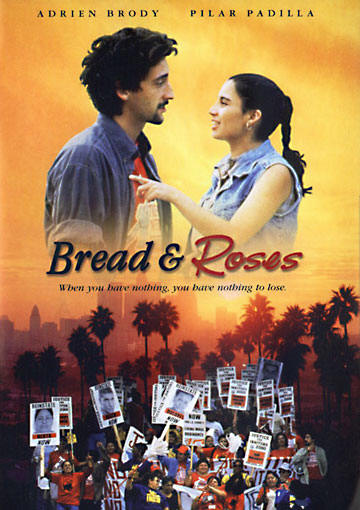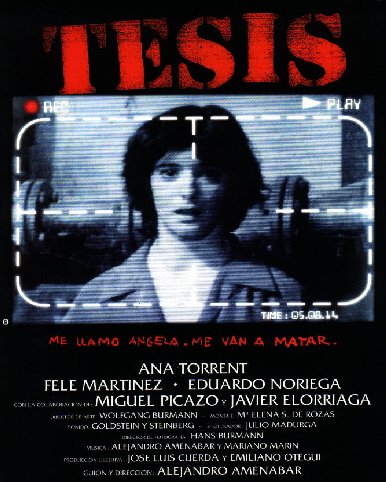Bread & Roses
 Once upon a time in Los Angeles, in the 1990s, the biggest labor strife to hit the town in fifty years was the janitor’s service union strike, a group made up of mostly legal and illegal immigrants from south of the border (giving it an especially underdog meaning). The great British “kitchen sink realism” director Ken Loach (Riff-Raff, The Wind That Shakes the Barley) came and made Bread &Roses—a very special film that uses the labor dispute as a backdrop and in doing so made one of the best films in years about both Los Angeles and the immigrant experience.
Once upon a time in Los Angeles, in the 1990s, the biggest labor strife to hit the town in fifty years was the janitor’s service union strike, a group made up of mostly legal and illegal immigrants from south of the border (giving it an especially underdog meaning). The great British “kitchen sink realism” director Ken Loach (Riff-Raff, The Wind That Shakes the Barley) came and made Bread &Roses—a very special film that uses the labor dispute as a backdrop and in doing so made one of the best films in years about both Los Angeles and the immigrant experience.
Looking for work, Maya (Pilar Padilla) sneaks into the country, joining her sister Rosa (Elpidia Carrillo) who is legal (married to an American). Eventually Maya gets work cleaning high-rise office buildings, but every corner she turns there seems to be someone wanting to exploit her and take advantage of her illegal status (both sexually and economically). After being befriended by labor activist Sam Shapiro (Adrien Brody), Maya eventually becomes a leader and helps to organize the union, becoming sort of a Mexican “Norma Rae.” This leads to complications with her sister, who doesn’t want to rock the boat and is already taking great chances boarding her.
Tesis
 A man jumps in front of a train and commits suicide, forcing everyone to exit and walk past the bloody scene in a tunnel. Among the commuters is Angela (Ana Torrent), a college senior. She witnesses the curiosity of the passengers who eagerly try to get a glimpse of the morbid scene, and she, too, wanders closer in order to get a look. She decides to write her thesis paper on audiovisual violence and its relation to the masses. The interest comes from not only the scene on the train, but the roll of violence in the media. However, being new to the concept, and yet observing it all her life, she finds many obstacles in obtaining footage that is violent and/or pornographic. In short, she comes to the conclusion that she needs access to footage that is too crude for television.
A man jumps in front of a train and commits suicide, forcing everyone to exit and walk past the bloody scene in a tunnel. Among the commuters is Angela (Ana Torrent), a college senior. She witnesses the curiosity of the passengers who eagerly try to get a glimpse of the morbid scene, and she, too, wanders closer in order to get a look. She decides to write her thesis paper on audiovisual violence and its relation to the masses. The interest comes from not only the scene on the train, but the roll of violence in the media. However, being new to the concept, and yet observing it all her life, she finds many obstacles in obtaining footage that is violent and/or pornographic. In short, she comes to the conclusion that she needs access to footage that is too crude for television.
There are two sources that she expects to be quite lucrative in her quest for information. The first is her cinema professor, who is directing her thesis and has access to the school's film archives. The second proves to be more beneficial. Chema (Fele Martinez), a fellow student in her class, is rumored to be a sadist with a personal library of the kinds of films she needs to research. When she asks to see his collection, he is cold and unresponsive, but soon agrees to help her based on her good looks. What he shows her would be the equivalent to the shock value films, Faces of Death—film compilations that feature real accounts of torture, executions, etc. She's disturbed by the films, mainly because she realizes that there are people like Chema who are target audiences, and therefore the films have a sort of industry.
Timecrimes

Timecrimes is sort of like a darker version of that "Treehouse of Horror" episode of The Simpsons where Homer's toaster becomes a time machine and he keeps screwing up the future by altering the past. It starts off with a similarly dimwitted protagonist and comic dialogue, anyway, but then unexpectedly evolves into an effectively puzzling thriller that, once you think you know where it's going, manages to twist its way into a place you never could have predicted, but which only makes sense. BloodyDisgusting.com calls it, "One of the best time travel movies of all time," and I'll agree in that it's one of the most uniquely satisfying and intelligent I've ever seen.
Héctor and Clara just moved into a new home privately located in a scenic forest in Spain, and Héctor begins noticing some bizarre signs no less than a few seconds into the film. The phone rings but no one appears to be on the other end. He calls the number back but only gets a voicemail asking for a security code. "How can anyone know this number?" he asks his wife. "We just moved in." Later, while lounging on the front lawn and taking in views of the forest with his binoculars, he sees a woman stripping off her clothes. Venturing into the woods for a closer look, Héctor is suddenly attacked by a scissor-wielding maniac covered in bloody bandages. He makes a run for it, eventually stumbling on a high-tech looking science lab. He finds a radio and calls for help, where a scientist named El Joven guides him to a safer part of the building. But what Héctor finds determines his fate in ways he, and I doubt any audience watching, could predict.
Continue ReadingLolo

This is the kind of movie that was made with various limitations that must be taken into account. I’ll lay all the flaws out on the line, and in the end you can be the judge. The lighting is horrendous, but due to the grizzly subject matter it works. I can’t imagine what kind of equipment they used, but many of the scenes are shot at night, which normally boosts a film’s budget by several degrees. The camera work, however, is awesome. I’m not sure how that’s possible, but I’d love to see how they crafted the various overhead shots and rotational pans, similar to some popular French films and 360 shots that Spike Lee used in the '90s. You could say that the darkness provides a good storytelling device for this film, seeing as how it has some very violent scenes, but there were honestly some shots where I could hardly see the characters or follow what was going on. The music is interestingly different, spanning from Mexican hard rock/punk to boleros, but it does lack proper placement and flow. The film is also fairly short and resolved with a bit of haste.
Now, if the above would not deter you from taking a look, I think you’d be as pleased with the film as I was. Instead of writing this review in a regular sense, I'd like to add a bit of analysis, which will better explain why I like it so much. Without spoiling the entire plot for you - or the ending - I'd say that if you are annoyed by religious overtones and metaphors in films, this might not be a movie you'd like. My next statement might not be as easily swallowed by some people, but certain elements in the film's plot and emotive efforts reminds me of two of my favorite movies, Pixote and Mulholland Drive. This is not a comparison, but simply an automatic mental note. It reminds me of the slum-element and young protagonist of Pixote (along with the poor production); but with Mulholland Drive, the resemblance for me is in the importance of a key object. In David Lynch's movie, it is the blue box and key that holds the fate for the lead characters and alters their past and future. In a similar sense, a golden watch and a pair of red sneakers are two simple props from which all the events in this movie can be pivoted.
Continue ReadingExterminating Angel

In 1962, only a year after his hugely successful and critically acclaimed breakout film, Viridiana, Luis Bunuel created Exterminating Angel. It was fairly well received and admired in the initial release, but it would take over a decade of films to follow in its wake for Exterminating Angel to be considered one of Bunuel’s best films and as a masterpiece of surrealist cinema.
The story is simple: guests of an upper-class dinner party find themselves unable to leave. Why? Well, no one can figure that out. More importantly, no one is willing to make an attempt to figure it out. And from this absurd circumstance, Bunuel weaves together a story filled with biting satire, debasing interactions, and a subtly repetitive time structure. In typical Bunuel fashion, humor and sadness occupy the same emotional terrain, feeding off one another in the same scene, creating a tense and anomalous atmosphere as the movie progresses.
Continue ReadingAmores Perros

Alejandro González Iñárritu may be best known for his film Babel (2006) or 21 Grams (2003), but his first feature film, Amores Perros, shows his ability in weaving stories together through the commonality of human suffering. Made in his home country, Mexico, the film is set in Mexico City, featuring three stories that are connected by a single car crash. Within these stories contain intensified, passionate characters with tales of love, loss, and dogs.
In the first, Octavio becomes involved with the dog-fighting business in order to make money so he can run away with his sister-in-law Susana and begin a new life. This plan falls out of reach as tragedy pursues, and the story ends with more than the loss of dreams.
Continue ReadingVolver

Warm and wonderful, Pedro Almodovar's Volver resonates with his favorite subjects: women, secrets and the transformative power of love. Framed with light suspense, rich imagery and sensuous color are amazing performances by the entire cast, most notably a voluptuous Penelope Cruz. Her courageous and spirited Raimunda is a struggling mother stuck in a bad marriage and bravely fulfilling the role of matriarch, not only to her sister and daughter but to a community of women loosely tied by tradition and committed through love. When her mother reappears as a ghost, Raimunda's life gets infinitely more complicated.
Violence and religious mysticism are catalysts and cards to the emotional evolution of all the characters but are hardly the point. As secrets are unveiled, the once shelled lives become full again with redemption and understanding and life seems to right itself, as if waiting for the perfect miracle. The weak become strong, the strong - weak, youth gains wisdom and age renews its joy for life.
Continue Reading




